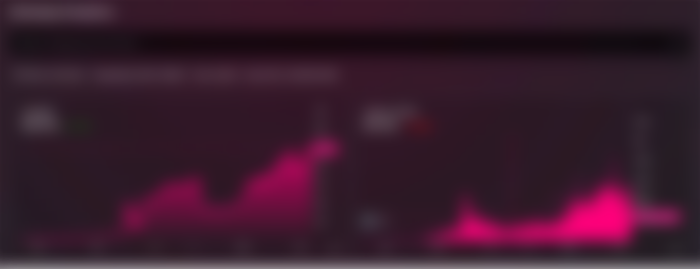Token Review: Uniswap (UNI)
This week on Token review I am analysing Uniswap!
I'm sure you have already heard of this coin!
OVERVIEW
The Uniswap protocol, built on the Ethereum blockchain, allows users to easily exchange between any ERC-20 tokens in a completely decentralized manner. This means that users can choose to easily trade Ethereum-based tokens directly from their own personal wallets without having to give up their custody of funds throughout the process.
Launched in November of 2018, Uniswap was founded by Hayden Adam, a young yet talented developer/designer who was relatively new to Solidity. With a $100k grant from the Ethereum Foundation, Hayden and his small team of less than 10 were able to build a compelling DEX which has garnered significant traction since launch. Back in April of 2019, Uniswap closed a $1M seed round lead by Paradigm. With this, Uniswap went on to release Uniswap V2 in May of 2020. Uniswap has since raised an $11M Series A round and launched its native governance token.

Uniswap is an automated liquidity protocol and operates using two smart contracts. It is one of the most popular decentralized exchanges or DEX. You can become a liquidity provider for a pool on this protocol and swap for other currencies.
Uniswap has 2 main functions. This includes swaps and pools.
Uniswap Swap enables users to exchange ETH currency for other ERC20 tokens.
Uniswap liquidity pool allows users to make money by providing liquidity. Users make money by depositing tokens in the pool. In return, they receive pool tokens.
This liquidity protocol gives you access to exchange ERC20 tokens. After connecting to the cryptocurrency wallet of your choice, you can start exchanging coins.

Uniswap removes the concept of order books in favor of an automated market maker. Rather than specifying price what price to buy or sell at, users merely select an input and output token while Uniswap provides a market rate. Simply connect a web 3 wallet, select the asset you want to trade, the asset you wish to receive and taaac! Uniswap automatically processes the transaction and updates your wallet balance.
Why should I prefer Uniswap?
Compared with other DEX competitors, Uniswap has many advantages for small traders. Specifically, Uniswap does not charge listing fees, does not require local tokens, and is the cheapest gas cost in any DEX. The project is open source on GitHub and essentially unlicensed, which means that anyone can create any ERC market as long as they have an equal amount of ETH to support it. Essentially, this allows new items to create a base price for their tokens after adding appearance to the game. Uniswap is currently one of the most active DEXs and quickly became the actual exchange for DeFi tokens.
In a world where hurdles and barriers to entry continue to limit adoption, Uniswap provides a much needed DEX experience that traders have long been searching for. With that being said, it should be emphasized that only Ethereum-based assets are currently supported in the current version. While it is possible to wrap cryptocurrencies like Bitcoin (WBTC) and trade it via Uniswap, at this point in time other protocols are not supported via Uniswap markets.
DEEPENING
Now we start with the in-depth part of the protocol.
As I said earlier it is a protocol built on the Ethereum blockchain, that allows users to easily exchange between any ERC-20 tokens in a completely decentralized manner. Their goal is to lower the barrier of entry to financial markets by making it easy to join the Decentralized Finance (DeFi) movement. The platform aims to allow anyone to create their own liquidity pools.
Although Uniswap is a very popular component in the DeFi ecosystem, it is not without criticism or flaws. In July 2020, complaints about "fake tokens" on the Uniswap exchange began to appear. Since anyone can list tokens on Uniswap, and its decentralized nature means that there is no need for censorship, it is easy for scammers to create tokens with names similar to popular DeFi platforms and entice users to buy worthless Token. In August 2020, Uniswap took some steps to try to alleviate this problem by introducing lists. These lists are decentralized solutions to the decentralization problem, aiming to determine the legitimacy of tokens based on the number of tokens and the credibility of these lists. Whether scammers will find a way to exploit this system remains to be seen, but for now, this seems to be a good way to solve the problem while still maintaining Uniswap’s inherent decentralization and still allowing legitimate projects to quickly and easily add their token.

You have probably noticed too how Uniswap has become more and more popular in the last period. So, let’s see some advantages!
First of all, you can have the access to different new coins. Since Uniswap is decentralized and owing to their popularity, a lot of projects are instead choosing to launch on Uniswap directly. This is crucial for traders that consider important to be the first ones to own the tokens because of the crazy fluctuation prices, especially when they first launch.
Then we can consider the low trading fees. It is much cheaper than most decentralized exchanges with only a flat fee of 0.30% per trade.
Uniswap allows you to retain full custody of your funds. So, there is no risk associated with centralized exchanges where you could stand to lose your funds if the exchange is hacked or goes bankrupt.
There is no Know Your Customer (KYC) process. Uniswap allows you to keep safe custody of your funds, don't require you to go through a lengthy KYC process and reveal your full name, passport details, etc. It also means that getting started with the exchange will be much faster and will drastically reduce the chances of your personal information falling into the wrong hands if the Exchange is hacked.
Regarding the UNI token, 60% of the UNI genesis supply is allocated to Uniswap community members, a quarter of which (15% of total supply) has already been distributed to past users. 1 billion UNI have been minted at genesis and will become accessible over the course of 4 years. A perpetual inflation rate of 2% per year will start after 4 years, ensuring continued participation and contribution to Uniswap at the expense of passive UNI holders.

So, should Uniswap be a great Decentralized Trading Protocol?
Let me know in a comment below!
So, be sure to follow my profile for receive the notification of my next articles on Read.Cash!



